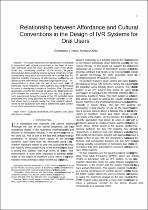 ResearchSpace
ResearchSpace
Relationship between affordance and cultural conventions in the design of IVR systems for oral users
JavaScript is disabled for your browser. Some features of this site may not work without it.
- ResearchSpace
- →
- Research Publications/Outputs
- →
- Conference Publications
- →
- View Item
| dc.contributor.author |
Ndwe, TJ

|
|
| dc.contributor.author |
Dlodlo, N

|
|
| dc.date.accessioned | 2014-03-04T08:53:05Z | |
| dc.date.available | 2014-03-04T08:53:05Z | |
| dc.date.issued | 2013-12 | |
| dc.identifier.citation | Ndwe, T.J and Dlodlo, N. 2013. Relationship between affordance and cultural conventions in the design of IVR systems for oral users. In: Proceedings of the International Joint Conferences on Computer, Information and Systems Sciences and Engineering (CISSE 2013), University of Brodgeport, USA, 12-14 December 2013 | en_US |
| dc.identifier.uri | http://hdl.handle.net/10204/7268 | |
| dc.description | Proceedings of the International Joint Conferences on Computer, Information and Systems Sciences and Engineering (CISSE 2013), University of Brodgeport, USA, 12-14 December 2013 | en_US |
| dc.description.abstract | This paper addresses the significance of affordance in association with cultural conventions in the design of voice user interfaces (VUI) for orally grounded users in the global South (i.e., developing countries of the world). The paper demonstrates that sensitivity towards cultural conventions which subsequently bring about affordance has more credence than the objective usability measures of effectiveness and efficiency as defined by the International Standards Organization (ISO). This demonstration is done with the aid of two case studies of Interactive Voice Response (IVR) systems that were developed for users in developing countries of Southern Africa. The paper specifically presents the concept of taking into consideration the shift between the standard cultural norm and the situational norm experienced during the usage of the IVR system. We have established that orally grounded technology users prefer a VUI that allows them to transfer easily from their standard cultural norms to the situational norm that is determined by the context of use of the presented technology. | en_US |
| dc.language.iso | en | en_US |
| dc.publisher | CISSE Online | en_US |
| dc.relation.ispartofseries | Workflow;12207 | |
| dc.subject | Cultural conventions | en_US |
| dc.subject | Oral users | en_US |
| dc.subject | Voice user interfaces | en_US |
| dc.subject | VUI | en_US |
| dc.subject | Interactive Voice Response | en_US |
| dc.subject | IVR | en_US |
| dc.subject | IVR systems | en_US |
| dc.title | Relationship between affordance and cultural conventions in the design of IVR systems for oral users | en_US |
| dc.type | Conference Presentation | en_US |
| dc.identifier.apacitation | Ndwe, T., & Dlodlo, N. (2013). Relationship between affordance and cultural conventions in the design of IVR systems for oral users. CISSE Online. http://hdl.handle.net/10204/7268 | en_ZA |
| dc.identifier.chicagocitation | Ndwe, TJ, and N Dlodlo. "Relationship between affordance and cultural conventions in the design of IVR systems for oral users." (2013): http://hdl.handle.net/10204/7268 | en_ZA |
| dc.identifier.vancouvercitation | Ndwe T, Dlodlo N, Relationship between affordance and cultural conventions in the design of IVR systems for oral users; CISSE Online; 2013. http://hdl.handle.net/10204/7268 . | en_ZA |
| dc.identifier.ris | TY - Conference Presentation AU - Ndwe, TJ AU - Dlodlo, N AB - This paper addresses the significance of affordance in association with cultural conventions in the design of voice user interfaces (VUI) for orally grounded users in the global South (i.e., developing countries of the world). The paper demonstrates that sensitivity towards cultural conventions which subsequently bring about affordance has more credence than the objective usability measures of effectiveness and efficiency as defined by the International Standards Organization (ISO). This demonstration is done with the aid of two case studies of Interactive Voice Response (IVR) systems that were developed for users in developing countries of Southern Africa. The paper specifically presents the concept of taking into consideration the shift between the standard cultural norm and the situational norm experienced during the usage of the IVR system. We have established that orally grounded technology users prefer a VUI that allows them to transfer easily from their standard cultural norms to the situational norm that is determined by the context of use of the presented technology. DA - 2013-12 DB - ResearchSpace DP - CSIR KW - Cultural conventions KW - Oral users KW - Voice user interfaces KW - VUI KW - Interactive Voice Response KW - IVR KW - IVR systems LK - https://researchspace.csir.co.za PY - 2013 T1 - Relationship between affordance and cultural conventions in the design of IVR systems for oral users TI - Relationship between affordance and cultural conventions in the design of IVR systems for oral users UR - http://hdl.handle.net/10204/7268 ER - | en_ZA |





